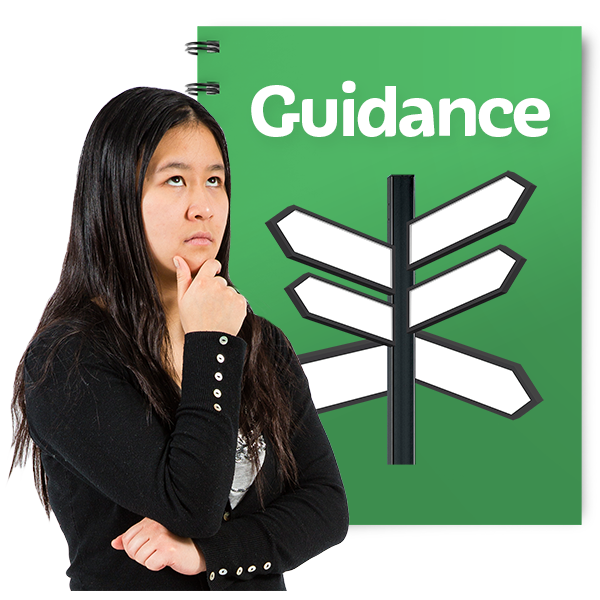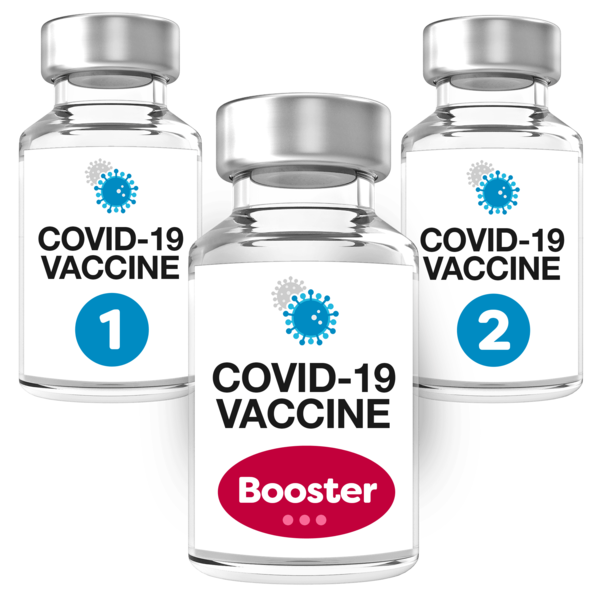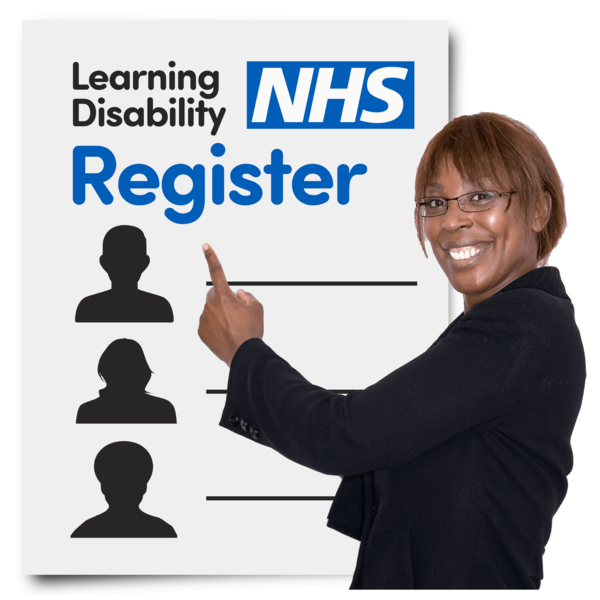New data from OpenSAFELY has revealed that people with a
learning disability
 A learning disability is to do with the way someone's brain works. It makes it harder for someone to learn, understand or do things.
are less likely compared to other priority groups to have had their booster jab. While Mencap’s helpline has also received reports from families about issues affecting people with a learning disability getting access to the booster - prompting fears that people who are most vulnerable to the virus may miss out on getting their jab.
A learning disability is to do with the way someone's brain works. It makes it harder for someone to learn, understand or do things.
are less likely compared to other priority groups to have had their booster jab. While Mencap’s helpline has also received reports from families about issues affecting people with a learning disability getting access to the booster - prompting fears that people who are most vulnerable to the virus may miss out on getting their jab.
Reports from several families to Mencap’s helpline have raised concerns that people with a learning disability – who are eight times more likely to die from COVID compared with the general population of England (i) - may miss out on getting their booster jab.
The learning disability charity fears the opening up of access to boosters for all adults means the priority list for booster jabs has effectively gone and anyone with additional needs - usually people who were identified as being highest priority for the booster - may struggle to access vaccination services.
Whilst NHS England has issued operational
guidance
 Guidance means being given clear instructions to be able to do something well.
to local areas on making reasonable adjustments for people with a learning disability and carers, families are reporting difficulties trying to get the booster jab for their loved one with a learning disability, despite the fact they should be prioritised. Whilst walk-in clinics are now widely available, some people with a learning disability can find busy and chaotic environments challenging, making it vital that teams on the ground are supported to make reasonable adjustments and ensure that groups vulnerable to COVID can access vital boosters.
Guidance means being given clear instructions to be able to do something well.
to local areas on making reasonable adjustments for people with a learning disability and carers, families are reporting difficulties trying to get the booster jab for their loved one with a learning disability, despite the fact they should be prioritised. Whilst walk-in clinics are now widely available, some people with a learning disability can find busy and chaotic environments challenging, making it vital that teams on the ground are supported to make reasonable adjustments and ensure that groups vulnerable to COVID can access vital boosters.
The warnings come as new data from OpenSAFELY reveals that people with a learning disability are less likely compared to the other original
vaccine
 A vaccine is medicine that helps your body to fight an infection in the future.
priority groups - outlined by the Joint Committee on Vaccination and Immunisation - to have had their booster jab (ii). The data from OpenSAFELY - which includes figures on booster jab and third dose vaccinations up until 15th December – has highlighted that only around 57% of people with a learning disability aged 16-64 have had their booster jab (iii).
A vaccine is medicine that helps your body to fight an infection in the future.
priority groups - outlined by the Joint Committee on Vaccination and Immunisation - to have had their booster jab (ii). The data from OpenSAFELY - which includes figures on booster jab and third dose vaccinations up until 15th December – has highlighted that only around 57% of people with a learning disability aged 16-64 have had their booster jab (iii).
In contrast, 92% of all over 80s and 94% of all 70-79 year olds have received their booster, while three-quarters (74%) of those aged 16-69 who were in the shielding category have gotten their jab. Similarly, 89% of all those aged 65-69 and 81% of 60-64 year olds have been boosted.
Even amongst older age groups, people with a learning disability are less likely to have gotten their jab. 92% of people aged 80+ have had their booster but only 79% of people with a learning disability aged over 80 have been boosted. The same is true amongst people aged 65-79, with people with a learning disability of this age being less likely to have had their jab.
This is all despite OpenSAFELY’s data showing there was high uptake of the first and second doses of vaccines amongst people with a learning disability, with around 96% of people with a learning disability having had their second dose (iv).
This data paints a worrying picture about the roll-out of boosters to people with a learning disability – a group who, even before COVID, were already twice as likely to die avoidably and died far younger than the general population (v). And during COVID many people with a learning disability have faced serious barriers to accessing healthcare, yet originally this group weren’t even prioritised for the COVID vaccine until a Government U-turn in February 2021 meant they could get priority access. Now once again they are struggling to get access to jabs.
Mencap is urging
the Government
 The Government are the people who run the country. The Government decide how much tax people should pay and how things like the National Health Service (NHS) should work.
and NHS England to ensure people with a learning disability get the support they need to access the booster now. The charity is also encouraging people with a learning disability to join the GP
Learning Disability Register
The Government are the people who run the country. The Government decide how much tax people should pay and how things like the National Health Service (NHS) should work.
and NHS England to ensure people with a learning disability get the support they need to access the booster now. The charity is also encouraging people with a learning disability to join the GP
Learning Disability Register
 The learning disability register is a list of people with a learning disability that the doctor’s surgery looks after.
to help get extra support accessing healthcare. Being on the register has many benefits and entitles people to extra support and more time when visiting the doctor, as well as annual health checks and prioritisation for key vaccinations like the flu and COVID vaccination.
The learning disability register is a list of people with a learning disability that the doctor’s surgery looks after.
to help get extra support accessing healthcare. Being on the register has many benefits and entitles people to extra support and more time when visiting the doctor, as well as annual health checks and prioritisation for key vaccinations like the flu and COVID vaccination.
Anne*, whose sister is 39 and has a severe learning disability, shares her story about their struggles getting the booster jab:
“My sister, Louise*, has a severe learning disability and autism
Autism is a disability. Autistic people find it difficult to understand what other people think and feel. They also find it difficult to tell people what they think and feel. Everyone with autism is different. , and is non-verbal. Louise needs extra support to be able to get the vaccine and stay safe - it’s just not an option for her to get the vaccine at a large, busy and chaotic centre which she would find far too overwhelming. It can’t just be the usual route but the GP says they can’t help and, when we ask for adjustments at the vaccine centre, they tell us to talk to our GP – who then tells us to speak to the vaccine centre and the circle repeats.
“At this point we’ve given up and we’re effectively isolating again to keep my sister safe. It shouldn’t be this way but it doesn’t seem like there’s any chance of getting the prioritisation or adjustments that my sister needs.”
Dan Scorer, Head of Policy and Public Affairs at the learning disability charity Mencap, said:
“We started 2021 with people with a learning disability not being prioritised for the vaccine, despite clear evidence emerging of the devastating impact COVID has had on our community
A community is the people and places in an area. . Following incredible progress in supporting people to have their first and second doses, we must ensure at this key time that people with a learning disability can access their boosters.
“People with a learning disability are at a far greater risk of dying from coronavirus than the general population. Findings published in The British Medical Journal in July 2021 showed that people with a learning disability with COVID are five times more likely to be admitted to hospital and eight times more likely to die compared with the general population of England (i). They must not be left behind and we are urging the Government and NHS England to ensure people with a learning disability get the support they need to access the booster now.”
* Names have been changed
-ENDS-
For further information or to arrange an
interview
 An interview is a meeting where you talk to someone or a group of people about something. When you have an interview for a job, you have to answer questions and say why you would be good at the job. The person who gives the best answers is offered the job.
with a Mencap
spokesperson
An interview is a meeting where you talk to someone or a group of people about something. When you have an interview for a job, you have to answer questions and say why you would be good at the job. The person who gives the best answers is offered the job.
with a Mencap
spokesperson
 A spokesperson is someone who speaks up about something. They usually speak up on behalf of a group or
organisation
A spokesperson is someone who speaks up about something. They usually speak up on behalf of a group or
organisation
 An organisation are a group of people who work together.
.
or
case study
An organisation are a group of people who work together.
.
or
case study
 A case study is a piece of writing that tells people more information about someone's experience.
, please contact Mencap’s media team on: media@mencap.org.uk or 020 7696 5414 (including out of hours).
A case study is a piece of writing that tells people more information about someone's experience.
, please contact Mencap’s media team on: media@mencap.org.uk or 020 7696 5414 (including out of hours).
Notes to editors:
- Findings published in The British Medical Journal in July 2021 (also by OpenSAFELY) showed that people with a learning disability with COVID are five times more likely to be admitted to hospital and eight times more likely to die compared with the general population of England. The findings are available here: http://press.psprings.co.uk/bmj/july/disability.pdf
- OpenSAFELY is a collaboration between the DataLab at Oxford University, the LSHTM EHR research group, TPP, EMIS and NHS England/NHSX. This weekly report on COVID-19 vaccination coverage in England uses data from 40% of general practices that use TPP electronic health record software. The data and report can be found here: https://reports.opensafely.org/reports/vaccine-coverage-thirdbooster-doses/. The data was last updated on 20 December 2021 and includes figures on third vaccinations up to 15th December inclusive. Only persons who had their second dose at least 14 weeks ago (08 Sep 2021) are included in the 'due' group.
- OpenSAFELY’s data shows only 57% of people with a learning disability aged 16-64 have had their booster jab. This does not include people with a learning disability in the separate shielding category. The data shows 74% of those aged 16-69 who were in the shielding category have gotten their jab, and this includes people with a learning disability who had to shield.
- OpenSAFELY’s data shows 96% of people with a learning disability have had their second COVID vaccine. This data is available here: https://reports.opensafely.org/reports/vaccine-coverage-second-doses/
- University of Bristol (2020) The Learning Disability Mortality Review (LeDeR) Programme Annual report 2019. LeDeR’s report shows that people with a learning disability died from an avoidable medical cause of death twice as frequently as people in the general population (44% of deaths of people with a learning disability; 22% of deaths in the general population). And data also suggests that the disparity between the age at death for people with a learning disability (age 4 years and over) and the general population (all ages) in 2019 was 22 years for males and 27 years for females.
About Mencap
There are approximately 1.5 million people with a learning disability in the UK. Mencap works to support people with a learning disability, their families and carers by fighting to change laws, improve services and access to
education
 Education is when you learn things. When you fill in a form to get a job, education means you write where you went to school, college or university.
,
employment
Education is when you learn things. When you fill in a form to get a job, education means you write where you went to school, college or university.
,
employment
 Employment means having a job.
and
leisure
Employment means having a job.
and
leisure
 Leisure is when you have time to do things you enjoy like playing sports or going to the pub.
facilities. Mencap supports thousands of people with a learning disability to live their lives the way they want: www.mencap.org.uk
Leisure is when you have time to do things you enjoy like playing sports or going to the pub.
facilities. Mencap supports thousands of people with a learning disability to live their lives the way they want: www.mencap.org.uk
For advice and information about learning disability and Mencap services in your area, contact Mencap’s Freephone Learning Disability Helpline on 0808 808 1111 (10am-3pm, Monday-Friday) or email helpline@mencap.org.uk.
What is a learning disability?
- A learning disability is a reduced intellectual ability which means that people might need support with everyday tasks – for example shopping and cooking, or travelling to new places – which affects someone for their whole life;
- Learning disability is NOT a mental illness or a learning difficulty, such as
dyslexia
 Dyslexia is a learning difficulty. People who have dyslexia can find it hard to read, write and spell.
. Very often the term ‘learning difficulty’ is wrongly used interchangeably with ‘learning disability’;
Dyslexia is a learning difficulty. People who have dyslexia can find it hard to read, write and spell.
. Very often the term ‘learning difficulty’ is wrongly used interchangeably with ‘learning disability’;
People with a learning disability can take longer to learn new things and may need support to develop new skills, understand difficult information and engage with other people. The level of support someone needs is different with every individual. For example, someone with a severe learning disability might need much more support with daily tasks than someone with a mild learning disability.